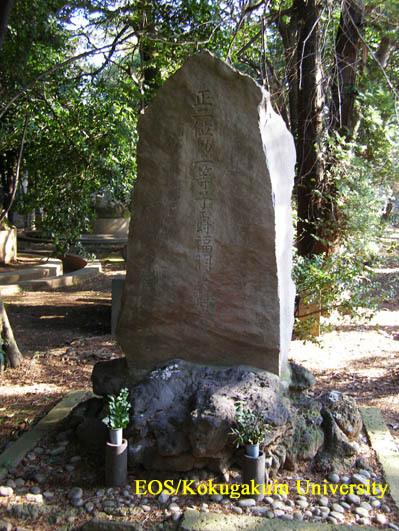- トップ
- Encyclopedia of Shinto
- Fukuba Bisei (Yoshishizu)
Encyclopedia of Shinto
| Main Menu: | |
| Links: |
詳細表示 (Complete Article)
| カテゴリー1: | 8. Schools, Groups, and Personalities |
|---|---|
| カテゴリー2: | Personalities |
| Title | Fukuba Bisei (Yoshishizu) |
| Text | (1831-197) Scholar of National Learning (Kokugaku) of the late Edo and early Meiji eras. Born in 1831 as the son of Fukuba Yoshitada, a samurai retainer of the Tsuwano Domain (in present-day Shimane Prefecture). Fukuba specialized in the study of kokugaku as a student at the Yōrōkan domainal academy, initially instructed by Oka Kumaomi and then by Ōkuni Takamasa when the latter reestablished residence in Tsuwano. Yoshishizu also traveled to Edo and Kyoto to deepen his scholarly pursuits. In 1862, in the midst of the tense political situation in Kyoto, Fukuba asked his domainal lord for permission to go to the city, where he negotiated with Chōshū domain adherents of the anti-foreign "Revere the Emperor, Expel the Barbarian" (sonnō jōi) faction, and there became Special Consultant (goyōgakari) to the Gakushūin Academy for children of the aristocracy. After the Chōshū faction was quelled, Yoshishizu traveled between his home region, the Chōshū domain (in present-day Yamaguchi Prefecture) and Dazaifu in northern Kyūshū to liaise with other clans and gather information. In 1867 he was commissioned by the Tsuwano Domainal lord to frame policies for the amendment of shrine and temple administration and for the reformation of funeral practices. Upon the establishment of the new Meiji government in 1868, Tsuwano lord Kamei Koremi recommended Yoshishizu for the post of Provisional Magistrate (gon-hanji) at the Office of Divinities (Jingi Jimukyoku). He was subsequently promoted to the posts of Junior Undersecretary for Kami Affairs (jingi no shōfuku), Senior Undersecretary for Kami Affairs (jingi daifuku), and Senior Undersecretary for Religious Education (kyōbu daifuku), in this way playing a leading role in the systematization of Imperial rites, formation of the modern Shinto shrine system, and promotion of policies for religious edification of the people. He lost standing in the Ministry of Religious Education in 1872 as the result of conflict with the so-alled "Satsuma faction" in the government, and thereafter served in a number of august posts; as member of the Council of Elders (genrōin), imperial tutor (jikō), working for the modern systematization of the Imperial house institution and the education of the Emperor in morals and ethics. Additionally, in his capacity as the de facto representative kokugaku scholar in the Meiji government, he oversaw to the publication of texts such as Kōko ruisan (Selected Compilation of Ancient Classics) and Kōko sōshi (Collection of Classic Poems). He was conferred the rank of Viscount (shishaku) in 1887, and in 1890 was made a member of the House of Peers (Upper House). Fukuba died August 14, 1907, at the age of seventy-seven. He was the author of Kojiki jindai keizu (Genealogy of the Age of the Gods in the Kojiki), Meiji no oshie (Teachings of Meiji), Shinkan yōgi (Important Issues for Shinto Priests), and Ichimu no ki (Diary of a Dream), among other works. -Takeda Hideaki |




